
Carnot: The Heartbeat of Central African Nature and Culture
Carnot, nestled in the lush greenery of the Central African Republic, offers a unique blend of natural beauty and vibrant local culture. Known for its diamond mines, this city is much more than its mineral wealth. Visitors are greeted with sprawling landscapes, rich wildlife, and the warm hospitality of the local people. The town is surrounded by dense forests, making it an excellent destination for eco-tourism. You can explore the nearby Dzanga-Sangha National Park, where forest elephants, gorillas, and a plethora of bird species make their home. This park is a paradise for nature lovers and photographers alike. Carnot is also a cultural hub, offering a glimpse into the traditional lifestyles of the Central African people. The local markets are a must-visit, where you can find handmade crafts, local foods, and vibrant fabrics. Meeting the local artisans and farmers provides a deeper understanding of the local way of life. While in Carnot, don't miss the opportunity to visit the nearby mining areas. Although access might be restricted, guided tours can offer insights into the diamond mining process and its impact on the local economy. The city's history and resilience are evident in its people, who are always ready to share their stories with visitors.
Local tips in Carnot
- Visit during the dry season (December to March) for the best weather and easier access to natural parks.
- Hire a local guide to explore Dzanga-Sangha National Park for a safe and informative experience.
- Bring cash, as credit card facilities are limited in Carnot.
- Learn a few basic phrases in Sango or French to enhance your interactions with locals.
- Respect local customs and traditions, especially when visiting markets and rural areas.
Carnot: The Heartbeat of Central African Nature and Culture
Carnot, nestled in the lush greenery of the Central African Republic, offers a unique blend of natural beauty and vibrant local culture. Known for its diamond mines, this city is much more than its mineral wealth. Visitors are greeted with sprawling landscapes, rich wildlife, and the warm hospitality of the local people. The town is surrounded by dense forests, making it an excellent destination for eco-tourism. You can explore the nearby Dzanga-Sangha National Park, where forest elephants, gorillas, and a plethora of bird species make their home. This park is a paradise for nature lovers and photographers alike. Carnot is also a cultural hub, offering a glimpse into the traditional lifestyles of the Central African people. The local markets are a must-visit, where you can find handmade crafts, local foods, and vibrant fabrics. Meeting the local artisans and farmers provides a deeper understanding of the local way of life. While in Carnot, don't miss the opportunity to visit the nearby mining areas. Although access might be restricted, guided tours can offer insights into the diamond mining process and its impact on the local economy. The city's history and resilience are evident in its people, who are always ready to share their stories with visitors.
When is the best time to go to Carnot?
Iconic landmarks you can’t miss
Notre-Dame of Bangui Cathedral
Discover the breathtaking Notre-Dame of Bangui Cathedral, a symbol of faith and architectural beauty in the heart of Central African Republic's capital.
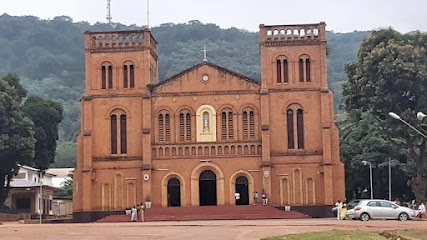
Hotel Levy's
Experience Bangui from Hotel Levy's, offering comfortable accommodations and a central location for exploring the city's vibrant culture.

Chinko Nature Reserve
Discover Chinko Nature Reserve: A vast Central African wilderness teeming with diverse wildlife and stunning landscapes, managed for conservation.
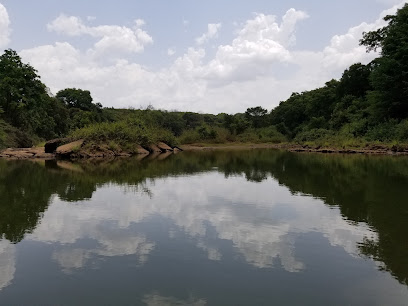
Chutes de Boali
Explore Chutes de Boali, a stunning waterfall in the heart of Central Africa, where nature's beauty and tranquility await every visitor.
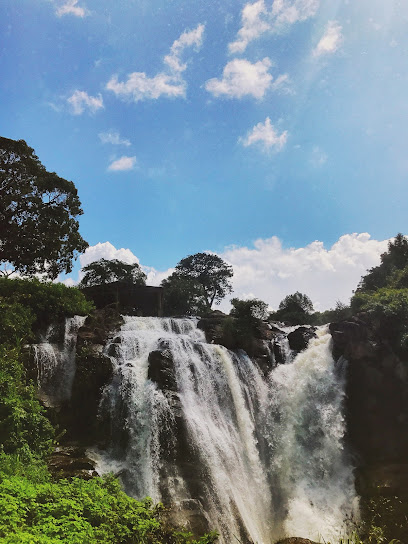
Grande Mosquée de Bangui
Explore the Grande Mosquée de Bangui, an architectural gem and a symbol of peace in Central African Republic's vibrant cultural landscape.
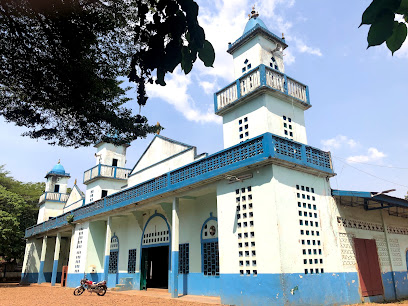
Sangha Lodge
Discover the tranquil beauty of Sangha Lodge in Djomo, a serene hotel retreat perfect for nature lovers and adventure seekers alike.
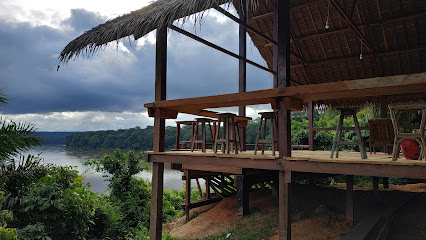
Doli Lodge
Discover the beauty of Bayanga at Doli Lodge, an inviting hotel offering comfort, local culture, and unforgettable wildlife experiences in the heart of the Central African Republic.
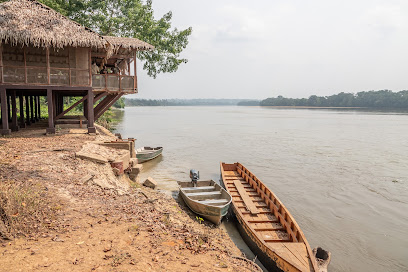
Manovo-Gounda-Saint Floris National Park
Explore the enchanting landscapes and rich biodiversity of Manovo-Gounda-Saint Floris National Park, a UNESCO World Heritage site in Central Africa.
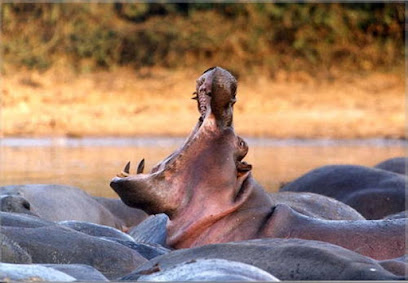
Boganda National Museum
Explore the vibrant culture and history of the Central African Republic at the Boganda National Museum, a treasure trove of art and heritage in Bangui.
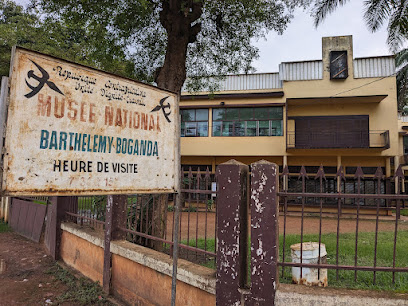
Aérodrome de Carnot
Discover the wonders of Central Africa from Aérodrome de Carnot, your gateway to stunning wildlife, vibrant cultures, and breathtaking landscapes.
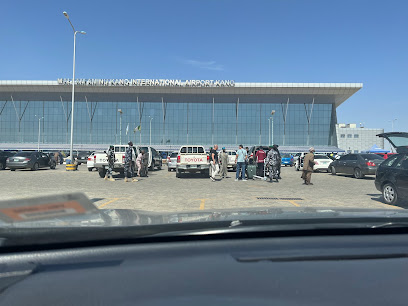
Санга
Discover the untamed beauty of Sangha National Forest, a haven for wildlife enthusiasts and nature lovers in Congo-Brazzaville.

Mbaéré Bodingué National Park
Explore the unique wildlife and breathtaking landscapes of Mbaéré Bodingué National Park, a paradise for nature lovers and adventure seekers in Central Africa.

Unmissable attractions to see
Notre-Dame of Bangui Cathedral
Explore the magnificent Notre-Dame of Bangui Cathedral, a historical and architectural marvel in the heart of Central African Republic's capital.
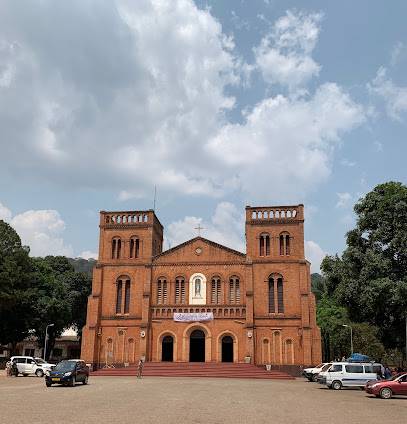
Chinko Nature Reserve
Discover the untouched beauty and rich biodiversity of Chinko Nature Reserve, a must-visit destination for nature lovers and adventure seekers in Central African Republic.
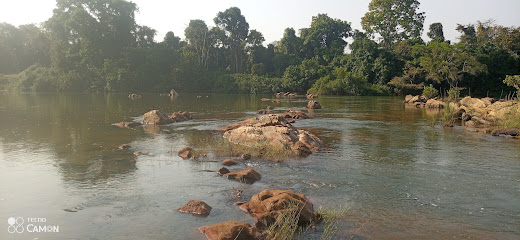
Chutes de Boali
Experience the breathtaking beauty of Chutes de Boali, a must-visit waterfall near Bangui, where nature's splendor meets adventure in the heart of Central African Republic.
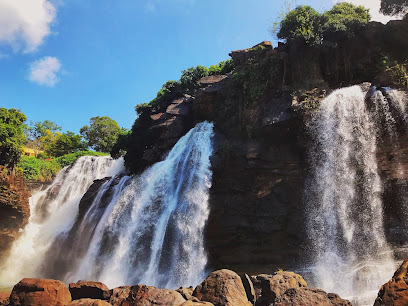
Grande Mosquée de Bangui
Discover the Grande Mosquée de Bangui, a stunning architectural gem symbolizing faith and culture in the heart of Central African Republic.
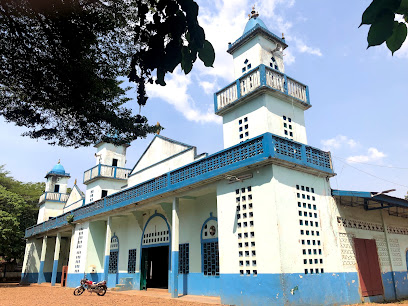
Manovo-Gounda-Saint Floris National Park
Explore the breathtaking landscapes and diverse wildlife of Manovo-Gounda-Saint Floris National Park in the Central African Republic, a UNESCO World Heritage site.
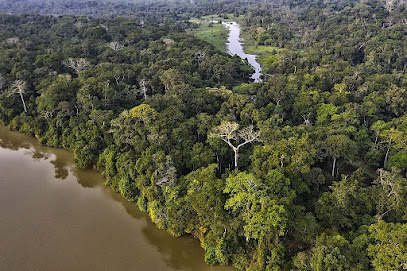
Boganda National Museum
Discover the fascinating history and culture of Central Africa at Boganda National Museum in the heart of Bangui.
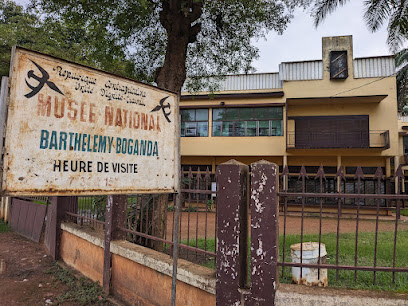
Pl. Carnot
Explore the vibrant Pl. Carnot in Feurs, a charming square that embodies the essence of local French culture and community spirit.
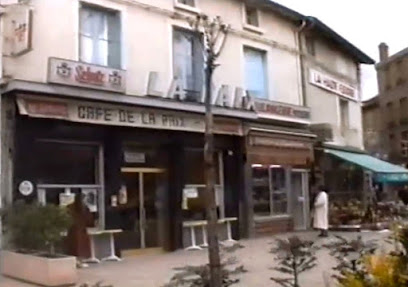
Essential places to dine
The carnivore restaurant
Savor the exotic flavors of Kenya at The Carnivore Restaurant – where every meal is a celebration of culinary tradition.
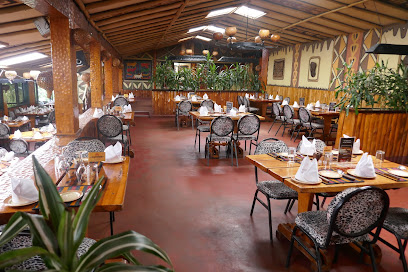
The Rock Restaurant Zanzibar
Experience unforgettable dining at The Rock Restaurant Zanzibar—where exquisite seafood meets breathtaking ocean views.
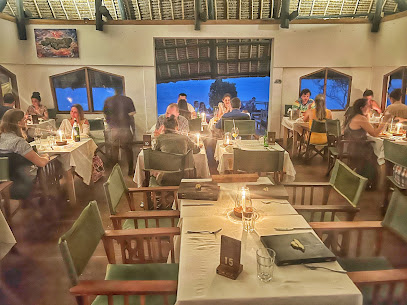
Akemi Revolving Restaurant
Experience exquisite dining with breathtaking panoramic views at Akemi Revolving Restaurant in Dar es Salaam.
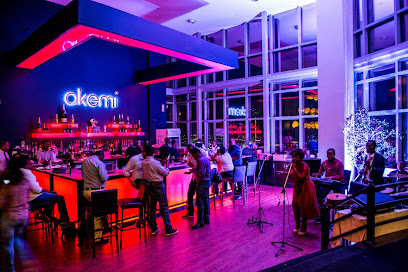
Ali Barbour's Cave Restaurant
Experience exquisite cuisine within the breathtaking natural setting of Ali Barbour's Cave Restaurant in Mombasa.
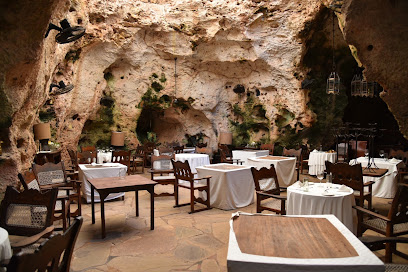
Mr. Kahawa Café, Restaurant & Accommodation
Experience the best of Tanzanian cuisine at Mr. Kahawa Café on Paje Beach - where delicious food meets breathtaking ocean views.
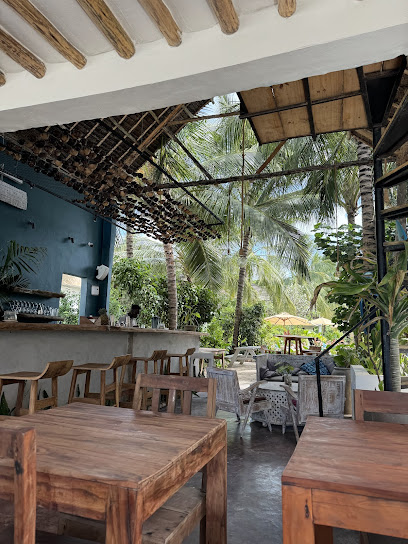
Cahaya Lounge
Experience the ultimate fusion of delicious food and vibrant nightlife at Cahaya Lounge in Madina – where every moment is a celebration.
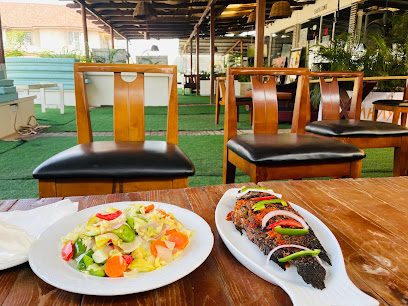
Bahari Pizza Restaurant Bungalows
Experience authentic Zanzibari cuisine at Bahari Pizza Restaurant Bungalows - where delicious food meets breathtaking ocean views.
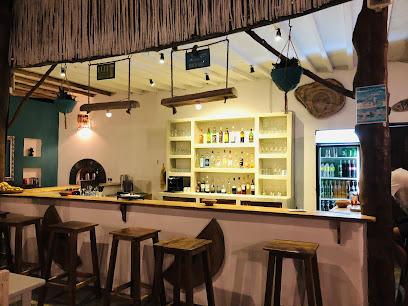
Calicut House Restaurant
Experience authentic Kerala cuisine at Calicut House Restaurant in Dubai's Al Qusais Industrial Area - a paradise for food enthusiasts.
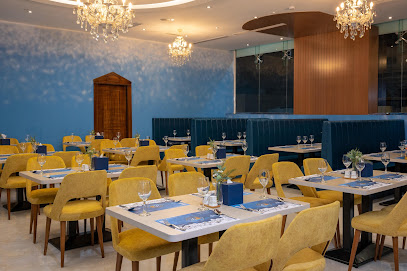
Fadhil Restaurant
Experience authentic Tanzanian flavors at Fadhil Restaurant in Jambiani—where local ingredients meet breathtaking ocean views.
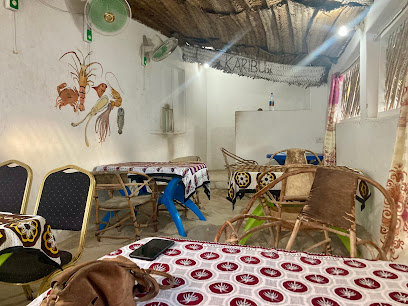
TEA TRUST CAFETERIA
Discover Tea Trust Cafeteria in Abu Dhabi – where exquisite teas meet delightful bites in a cozy atmosphere.
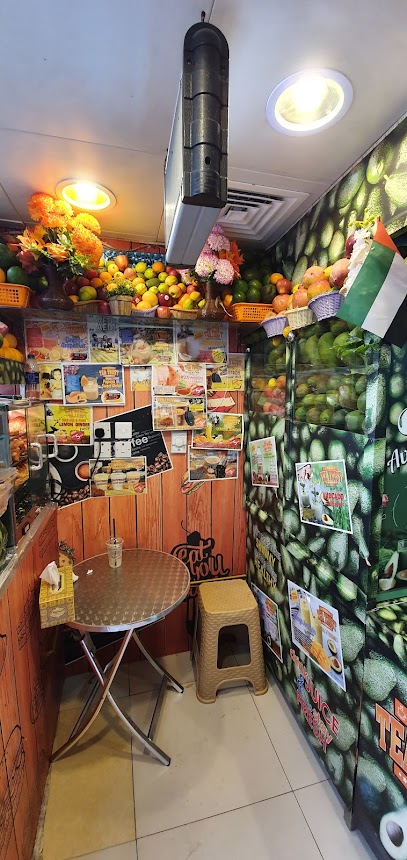
Gadea Boutique Hotel &Gadea Garden Italian Restaurant
Discover culinary excellence at Gadea Boutique Hotel & Gadea Garden Italian Restaurant in Jambiani, Zanzibar - where luxury meets local flavor.
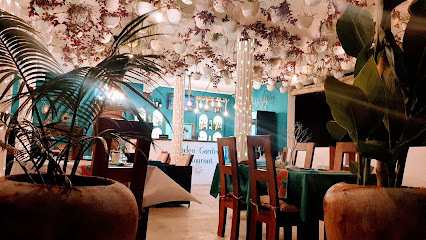
Relais des Chasses
Discover authentic Central African flavors at Relais des Chasses, where culinary excellence meets warm hospitality in Bangui.
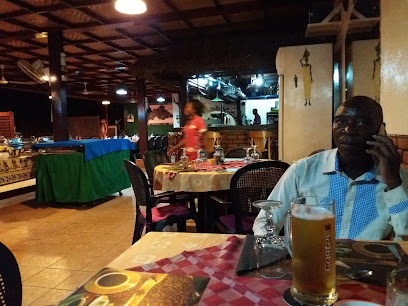
RFC Mabelah أر.أف.سي المعبيلة
Discover RFC Mabelah: A Culinary Gem in Oman Offering Delicious Local and International Dishes.
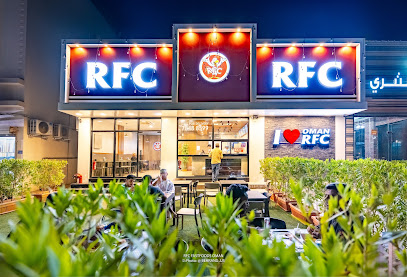
ENOC | 1666 | Dubai South
Experience convenience at ENOC 1666 in Dubai South - where fueling up meets dining out!
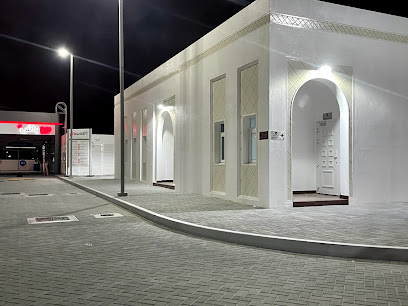
5 FOURCHETTES
Experience authentic Indian cuisine at 5 Fourchettes in Bangui – where every meal is a flavorful journey through India.
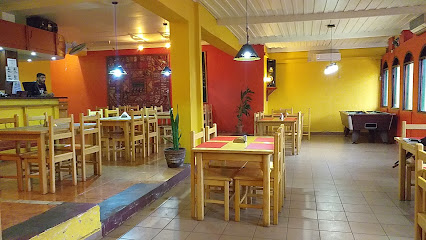
Markets, malls and hidden boutiques
Relais des Chasses
Experience the authentic flavors of Central Africa at Relais des Chasses, a charming restaurant and bed & breakfast in Bangui.

5 FOURCHETTES
Discover the flavors of India in Bangui at 5 Fourchettes, where a culinary journey awaits in a cozy and vibrant setting.

Hotel Levy's
Discover the heart of Bangui at Hotel Levy's, where comfort meets convenience in the vibrant capital of the Central African Republic.

Cafrina
Experience the vibrant flavors of Bangui at Cafrina, a restaurant offering an exquisite blend of local and international cuisine in a welcoming atmosphere.

Restaurant Le M'
Discover the flavors of Central Africa at Restaurant Le M', a culinary gem in Bangui offering authentic dishes and warm hospitality.

Corail
Explore Corail in Bangui for a delightful grocery shopping experience, featuring local produce and international favorites.
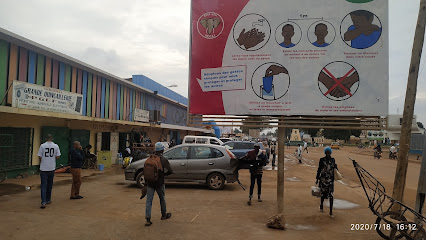
Chinko Nature Reserve
Discover the untouched beauty of Chinko Nature Reserve, where diverse wildlife and stunning landscapes await every traveler in Central Africa.
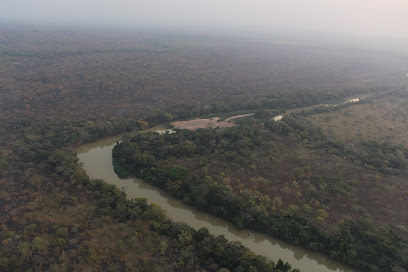
SANGO
Experience the vibrant flavors of Bangui at SANGO, a culinary hub offering a delightful fusion of local and international cuisine.
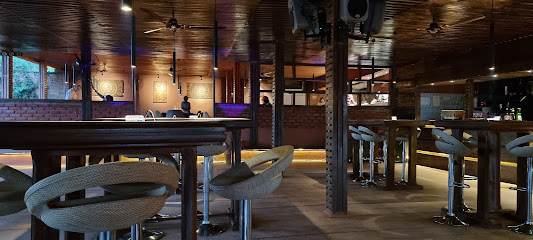
Bangui Mall
Experience the heart of Bangui at Bangui Mall - your ultimate destination for shopping, dining, and local culture in the Central African Republic.

Chutes de Boali
Explore the breathtaking Chutes de Boali, a stunning waterfall in Central Africa, offering a perfect blend of natural beauty and cultural experiences.
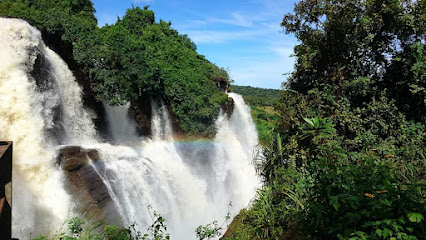
Hotel du Centre
Experience comfort and local culture at Hotel du Centre, your gateway to exploring the vibrant city of Bangui in the heart of Central African Republic.

Marché Central
Explore the lively Marché Central in Bangui, a vibrant marketplace for cosmetics and local culture, where beauty meets tradition in Central Africa.

L'Escale
Discover L'Escale: A vibrant restaurant in Bangui offering authentic Central African cuisine in a warm, welcoming atmosphere.

Sangha Lodge
Discover tranquility and adventure at Sangha Lodge in Djomo, a perfect blend of comfort and nature's beauty in the heart of Central Africa.
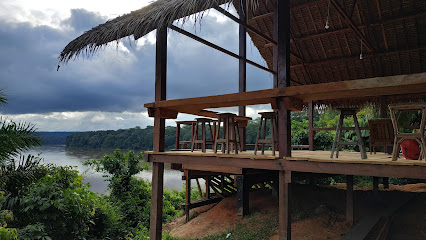
Doli Lodge
Experience the beauty of nature at Doli Lodge in Bayanga, where wildlife encounters and serene landscapes await every traveler.

Essential bars & hidden hideouts
Le Boj, Douala
Experience the vibrant flavors of Cameroon at Le Boj, Douala's premier restaurant and lounge offering a unique dining atmosphere.
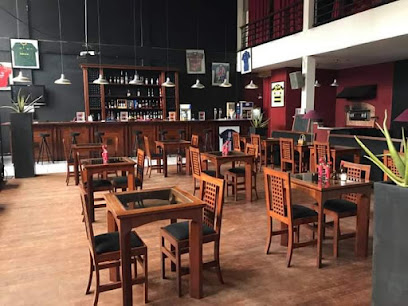
Relais des Chasses
Experience the flavors of Central Africa at Relais des Chasses in Bangui, where culinary excellence meets cozy accommodations.
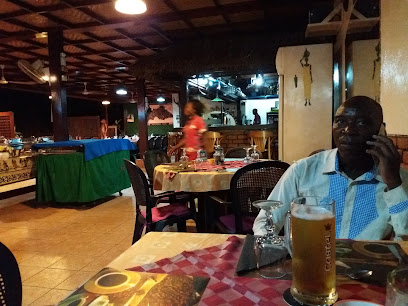
5 FOURCHETTES
Discover a world of flavors at 5 FOURCHETTES, Bangui's premier destination for authentic Indian cuisine, offering a unique dining experience.
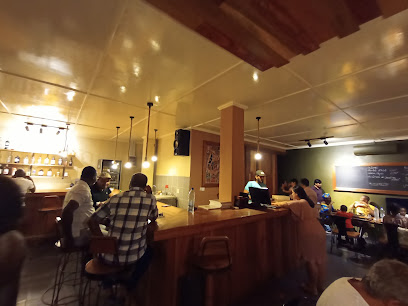
Cafrina
Discover the flavors of Bangui at Cafrina, a restaurant blending local cuisine with international flair in a warm, inviting atmosphere.
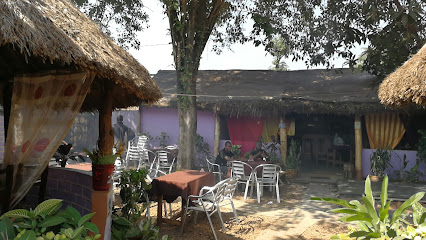
Restaurant Le M'
Experience the vibrant flavors of Central African cuisine at Restaurant Le M', a culinary haven in the heart of Bangui.
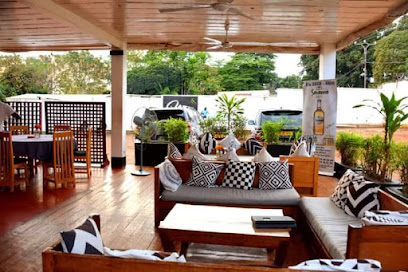
SANGO
Experience authentic Central African cuisine at SANGO, a vibrant restaurant in Bangui where flavors and culture come together.
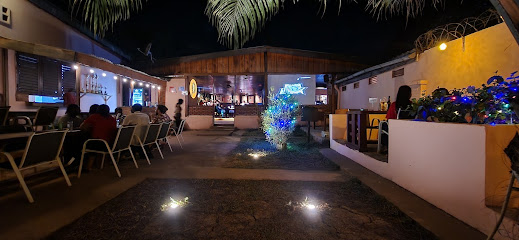
Chutes de Boali
Experience the breathtaking beauty of Chutes de Boali, a stunning waterfall in the Central African Republic, perfect for nature lovers and adventure seekers.
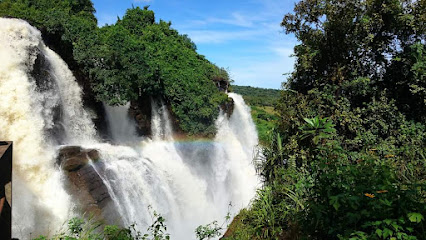
Sewa Bar
Experience the vibrant nightlife at Sewa Bar in Bangui, where colorful drinks and lively music create the perfect atmosphere for relaxation and fun.
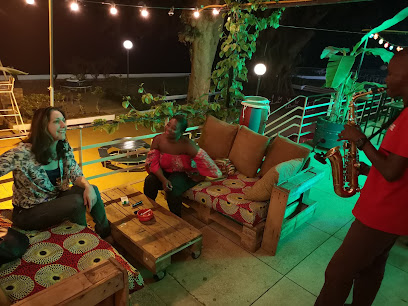
Le Balafon
Discover the vibrant nightlife at Le Balafon, a lively bar in Bangui offering a rich selection of drinks and a welcoming atmosphere for all visitors.
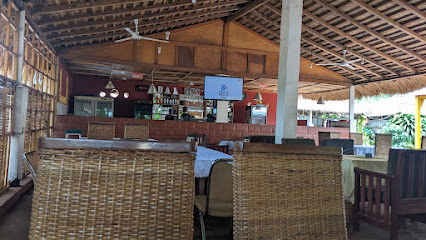
Hotel Somba
Discover the heart of Bangui at Hotel Somba, your cozy base for exploring Central African culture and vibrant city life.
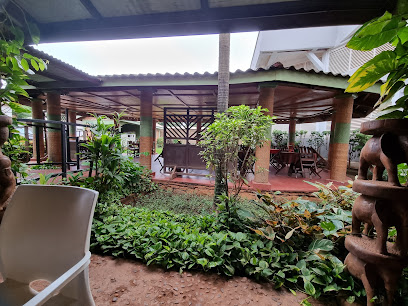
L'Escale
Experience the rich flavors of Central African cuisine at L'Escale, a vibrant restaurant in the heart of Bangui, perfect for every culinary enthusiast.
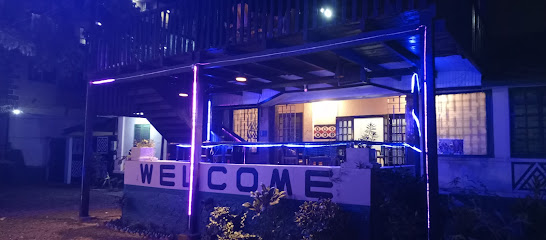
Doli Lodge
Experience comfort and adventure at Doli Lodge in Bayanga, where stunning natural beauty meets cozy accommodations, perfect for every traveler.
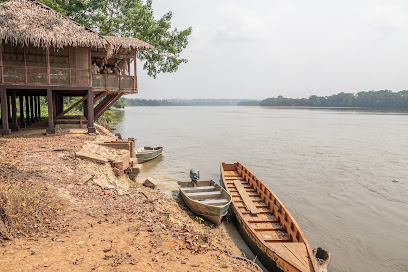
La Verdure
Experience the vibrant nightlife of Bangui at La Verdure, a lively bar offering a unique blend of local culture and refreshing drinks.
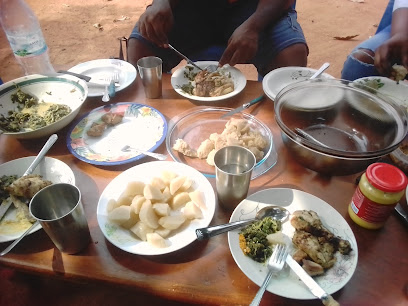
Mokaby Garden Lounge
Discover Mokaby Garden Lounge in Pointe-Noire, Congo, where local flavors meet a serene garden ambiance for an unforgettable dining experience.
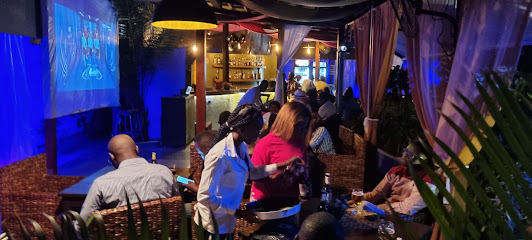
Local Phrases
-
- HelloMbote
[m-boh-teh] - GoodbyeKwaheri
[kwa-heh-ree] - YesEe
[eh] - NoTey
[teh-y] - Please/You're welcomeMalako
[mah-lah-koh] - Thank youMbotama
[m-boh-tah-mah] - Excuse me/SorryPardon
[pahr-dohn] - How are you?Moto na bino?
[moh-toh nah bee-noh] - Fine. And you?Malamu. Na yo?
[mah-lah-moo. nah yoh] - Do you speak English?Ozali kokomela lingala?
[oh-zah-lee koh-koh-meh-lah leen-gah-lah] - I don't understandNasambeli
[nah-sahm-beh-lee]
- HelloMbote
-
- I'd like to see the menu, pleaseNalingi koloba meni, tosuni
[nah-leen-gee koh-loh-bah meh-nee, toh-soo-nee] - I don't eat meatNalingi tebimi na ngombe
[nah-leen-gee teh-bee-mee nah ngohm-beh] - Cheers!Yambe!
[yahm-beh] - I would like to pay, pleaseNalingi kobanga, tosuni
[nah-leen-gee koh-bah-ngah, toh-soo-nee]
- I'd like to see the menu, pleaseNalingi koloba meni, tosuni
-
- Help!Eza!
[eh-zah] - Go away!Kokende!
[koh-ken-deh] - Call the Police!Kosakisa police!
[koh-sah-kee-sah poh-lees] - Call a doctor!Kosakisa dokoteli!
[koh-sah-kee-sah doh-koh-teh-lee] - I'm lostNazalaki kimia
[nah-zah-lah-kee kee-myah] - I'm illNazalaki mabanda
[nah-zah-lah-kee mah-bahn-dah]
- Help!Eza!
-
- I'd like to buy...Nalingi kobima...
[nah-leen-gee koh-bee-mah] - I'm just lookingNazongi koyeba
[nah-zohn-gee koh-yeh-bah] - How much is it?Yango ezali combien?
[yah-ngoh eh-zah-lee kohm-bee-ehn] - That's too expensiveYango ezali ya cher
[yah-ngoh eh-zah-lee yah shehr] - Can you lower the price?Ozali kokufuta prix?
[oh-zah-lee koh-koo-foo-tah prees]
- I'd like to buy...Nalingi kobima...
-
- What time is it?Heure ngayi nini?
[heu-reh ngah-yee nee-nee] - It's one o'clockEzali mokele moko
[eh-zah-lee moh-keh-leh moh-koh] - Half past (10)Mibale ya kumi na moya
[mee-bah-leh yah koo-mee nah moh-yah] - MorningMobali
[moh-bah-lee] - AfternoonMokwele
[moh-kweh-leh] - EveningMokuma
[moh-koo-mah] - YesterdayMokolo
[moh-koh-loh] - TodayNzila
[nzee-lah] - TomorrowLoboko
[loh-boh-koh] - 1Moya
[moh-yah] - 2Mibale
[mee-bah-leh] - 3Miyei
[mee-yeh-ee] - 4Minei
[mee-nay-ee] - 5Mitano
[mee-tah-noh] - 6Misanu
[mee-sah-noo] - 7Mitete
[mee-teh-teh] - 8Miono
[mee-oh-noh] - 9Misatu
[mee-sah-too] - 10Mikumi
[mee-koo-mee]
- What time is it?Heure ngayi nini?
-
- Where's a/the...?Eza wapi...?
[eh-zah wah-pee] - What's the address?Lokuta nini?
[loh-koo-tah nee-nee] - Can you show me (on the map)?Okoyeba nga (na carte)?
[oh-koh-yeh-bah ngah (nah kahr-teh)] - When's the next (bus)?Na ndako mingi?
[nah ndah-koh meen-jee] - A ticket (to ....)Billet (ya ....)
[bee-leh (yah)]
- Where's a/the...?Eza wapi...?
History of Carnot
-
Carnot, a city in the Central African Republic, traces its origins back to the late 19th century. Named after the French President Sadi Carnot, the city was established as a colonial outpost by French explorers and administrators. Its strategic location along the Mambéré River made it an important hub for trade and communication during the colonial era.
-
During the colonial period, Carnot became a significant center for the production of coffee and timber, which were major exports for the French colonial administration. The fertile lands around Carnot were ideal for agriculture, and the city grew as plantations flourished. This period also saw the construction of infrastructure such as roads and administrative buildings, many of which still stand today as reminders of the colonial past.
-
The Central African Republic gained independence from France on August 13, 1960. Carnot, like many other cities in the country, experienced significant changes during this period. The shift from colonial rule to independence brought about political and economic challenges. The city saw a decline in its economic activities, particularly in the coffee and timber industries, as the new government struggled to stabilize the economy.
-
Carnot is known for its rich cultural diversity, home to various ethnic groups including the Gbaya, Banda, and Mbum. This cultural mosaic contributes to a vibrant community life, with traditional music, dance, and festivals playing a central role. Visitors to Carnot can experience this cultural diversity through local markets, traditional ceremonies, and interactions with the hospitable residents.
-
Today, Carnot is a city that blends its historical heritage with contemporary life. While it faces ongoing challenges such as political instability and economic difficulties, the city remains a vital part of the Central African Republic. Efforts are being made to revive its agricultural sector and promote sustainable development. Additionally, Carnot's rich history and cultural heritage continue to attract tourists and researchers interested in exploring its past and present.
Carnot Essentials
-
Carnot is located in the southwestern part of the Central African Republic. The nearest international airport is Bangui M'Poko International Airport (BGF) in the capital city of Bangui, approximately 500 kilometers away. From Bangui, you can take a domestic flight to Berbérati Airport, which is closer to Carnot. Alternatively, you can travel by road, though the journey can be long and challenging due to road conditions. Public buses and private car hires are available options for road travel.
-
Within Carnot, transportation options include motorcycles (boda-bodas), taxis, and minibuses. Motorcycles are a popular and affordable way to get around the town. Taxis are available but may not always be metered, so agree on a fare beforehand. Minibuses, known locally as 'taxi-brousses,' connect Carnot to nearby towns and villages. For a more flexible travel plan, consider renting a vehicle, though driving conditions can be difficult.
-
The official currency in the Central African Republic is the Central African CFA franc (XAF). While some hotels and larger establishments may accept credit cards, it's advisable to carry cash, especially for smaller vendors and local markets. ATMs are rare in Carnot, so ensure you withdraw sufficient cash in Bangui or Berbérati before traveling. Currency exchange services are also limited.
-
Carnot is generally safe for tourists, but it's essential to exercise caution. Avoid walking alone at night and stay away from poorly lit areas. Be cautious of pickpockets and petty theft, especially in crowded places like markets. Certain neighborhoods may have higher crime rates; it's wise to seek local advice on areas to avoid. Always keep your belongings secure and stay aware of your surroundings.
-
In case of emergency, dial 117 for police assistance and 118 for medical emergencies. The main hospital in Carnot offers basic medical services, but for more severe cases, you may need to travel to a larger city like Bangui. It is strongly recommended to have travel insurance that covers medical emergencies and evacuation. Pharmacies are available for minor health issues and over-the-counter medications.
-
Fashion: Do dress modestly, especially in rural and religious areas. Avoid wearing revealing clothing. Religion: Do respect local religious customs and traditions. Remove your shoes and cover your head when entering places of worship. Public Transport: Do be respectful and patient when using public transport. Don't eat or drink on public transport. Greetings: Do greet people with a handshake. A friendly nod or wave is also appreciated. Eating & Drinking: Do try local foods and accept hospitality graciously. Don't refuse food or drink offerings, as it may be considered impolite.
-
To experience Carnot like a local, visit the bustling local markets where you can buy fresh produce and traditional crafts. Engage with the locals, who are often friendly and eager to share their culture and traditions. Don't miss exploring the nearby Dzanga-Sangha National Park, which offers incredible wildlife viewing opportunities. For a unique cultural experience, attend local festivals and events that showcase traditional music, dance, and cuisine.
Nearby Cities to Carnot
-
Things To Do in Bertoua
-
Things To Do in Ngaoundéré
-
Things To Do in Yaoundé
-
Things To Do in Bafia
-
Things To Do in Foumban
-
Things To Do in Garoua
-
Things To Do in Ebolowa
-
Things To Do in Bitam
-
Things To Do in Yola
-
Things To Do in Bafoussam
-
Things To Do in Mbouda
-
Things To Do in Bamenda
-
Things To Do in Dschang
-
Things To Do in Edea
-
Things To Do in Maroua






